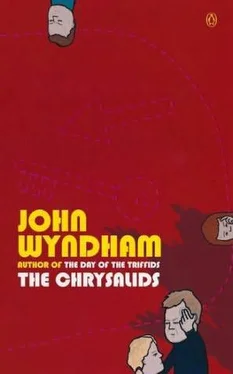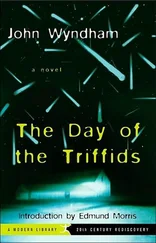The season was a good one, sunny, yet well watered so that even farmers had little to complain of other than the pressure to catch up with the work that the invasion had interrupted. Except among the sheep the average of Offences in the spring births had been quite unusually low. The impending crops were so orthodox that the inspector had posted only a single field, belonging to Angus Morton, for burning. Even among the vegetables there was little deviation; the solonaceae as usual provided most of what there was. All in all, the season looked like setting up a Purity record, and condemnations were so few that even my father was pleased enough to announce guardedly in one of his addresses that Waknuk would seem to be giving the forces of Evil quite a setback this year — and it was a matter for thanksgiving that retribution for the importation of the great-horses had been visited upon their owner himself, and not upon the whole community.
With everyone so busy I was able to get away early, and during those long summer days Sophie and I roamed more widely than before, though we did our adventuring with caution, and kept it to little-used ways in order to avoid encounters. Sophie’s upbringing had given her a timidity towards strangers that was nearly an instinct. Almost before one was visible she vanished noiselessly. The only adult she had made friends with was Corky, who looked after the steam-engine. Everyone else was dangerous.
We discovered a place up the stream where there were banks of shingle. I liked to take off my shoes, roll up my trousers, and paddle there, examining the pools and crannies. Sophie used to sit on one of the large, flat stones that shelved into the water, and watch me wistfully. Later we went there armed with two small nets that Mrs.. Wender had made, and a jar for the catch. I waded about fishing for the little shrimp-like creatures that lived there while Sophie tried to scoop them up by reaching from the bank. She did not do very well at it. After a time she gave up, and sat watching me enviously. Then, greatly daring, she pulled off a shoe, and looked at her naked foot reflectively. After a minute she pulled off the other. She rolled her cotton trousers above her knees, and stepped into the stream. She stood there for a thoughtful moment, looking down through the water at her foot on the washed pebbles. I called to her:
‘Come over this way. There’s lots of them here.’
She waded towards me, laughing and excited.
When we had had enough of it we sat on the flat rock, letting our feet dry in the sun.
‘They’re not really horrible, are they?’ she said, regarding hers judicially.
‘They’re not horrible at all. They make mine look all knobbly,’ I told her, honestly. She was pleased about that.
A few days later we went there again. We stood the jar on the flat stone beside our shoes while we fished, and industriously scampered back to it now and then with our catch, oblivious of all else until a voice said:
‘Hullo, there, David!’
I looked up, aware of Sophie standing rigid behind me.
The boy who had called stood on the bank, just above the rock where our things lay. I knew him. Alan, the son of John Ervin, the blacksmith; about two years older than I was. I kept my head.
‘Oh, hullo, Alan,’ I said, unencouragingly.
I waded to the rock and picked up Sophie’s shoes.
‘Catch!’ I called as I threw them to her.
One she caught, the other fell into the water, but she retrieved it.
‘What are you doing?’ Alan asked.
I told him we were catching the shrimp-things. As I said it I stepped casually out of the water on to the rock. I had never cared much for what I knew of Alan at the best of times, and he was by no means welcome now.
‘They’re no good. Fish are what you want to go after,’ he said contemptuously.
He turned his attention to Sophie, who was wading to the bank, shoes in hand, some yards farther up.
‘Who’s she ?’ he inquired,
I delayed answering while I put on my shoes. Sophie had disappeared into the bushes now.
‘Who is she?’ he repeated. ‘She’s not one of the—’ He broke off suddenly. I looked up and saw that he was staring down at something beside me. I turned quickly. On the flat rock was a footprint, still undried. Sophie had rested one foot there as she bent over to tip her catch into the jar. The mark was still damp enough to show the print of all six toes clearly. I kicked over the jar. A cascade of water and struggling shrimps poured down the rock, obliterating the footprint, but I knew, with a sickly feeling, that the harm had been done.
‘Ho!’ said Alan, and there was a gleam in his eye that I did not like. ‘Who is she?’ he demanded again.
‘She’s a friend of mine,’ I told him.
‘What’s her name?’
I did not answer that.
‘Huh, I’ll soon find out, anyway,’ he said with a grin.
‘It’s no business of yours,’ I told him.
He took no notice of that; he had turned and was standing looking along the bank towards the point where Sophie had disappeared into the bushes.
I ran up the stone and flung myself on him. He was bigger than I was, but it took him by surprise, and we went down together in a whirl of arms and legs. All I knew of fighting was what I had learnt from a few sharp scuffles. I simply hit out, and did my furious best. My intention was to gain a few minutes for Sophie to put her shoes on and hide; if she had a little start, he would never be able to find her, as I knew from experience. Then he recovered from his first surprise and got in a couple of blows on my face which made me forget about Sophie and sent me at it, tooth and nail, on my own account.
We rolled back and forth on a patch of turf. I kept on hitting and struggling furiously, but his weight started to tell. He began to feel more sure of himself, and I, more futile. However, I had gained something: I’d stopped him going after Sophie straight away. Gradually he got the upper hand, presently he was sitting astride of me, pummelling me as I squirmed. I kicked out and struggled, but there wasn’t much I could do but raise my arms to protect my head. Then, suddenly, there was a yelp of anguish, and the blows ceased. He flopped down on top of me. I heaved him off, and sat up to see Sophie standing there with a large rough stone in her hand.
‘I hit him,’ she said proudly, and with a touch of wonderment. ‘Do you think he’s dead?’
Hit him she certainly had. He lay white-faced and still, with the blood trickling down his cheek, but he was breathing all right, so he certainly wasn’t dead.
‘Oh, dear,’ said Sophie in sudden reaction, and dropped the stone.
We looked at Alan, and then at one another. Both of us, I think, had the impulse to do something for him, but we were afraid.
‘No one must ever know. No one!’ Mrs. Wender had said, so intensely. And now this boy did know. It frightened us.
I got up. I reached for Sophie’s hand and pulled her away.
‘Come along,’ I told her urgently.
John Wender listened carefully and patiently while we told him about it.
‘You’re quite sure he saw? It wasn’t simply that he was curious because Sophie was a stranger?’ he asked at the end.
‘No,’ I said. ‘He saw the footmark; that’s why he wanted to catch her.’
He nodded slowly.
‘I see,’ he said, and I was surprised how calmly he said it.
He looked steadily at our faces. Sophie’s eyes were big with a mixture of alarm and excitement. Mine must have been pink-rimmed, with dirty smears trailing from them. He turned his head and met his wife’s gaze steadily.
‘I’m afraid it’s come, my dear. This is it,’ he said.
‘Oh, Johnny–’ Mrs. Wender’s face was pale and distressed.
Читать дальше












